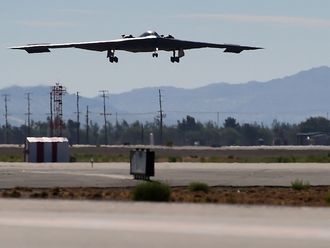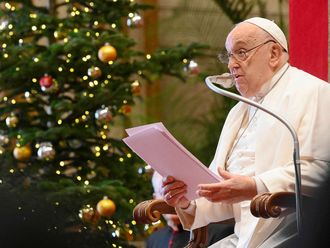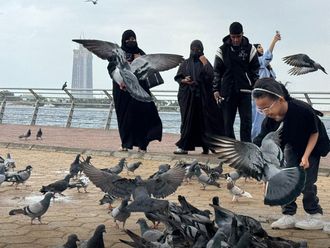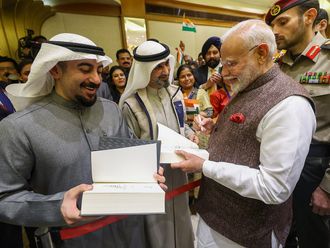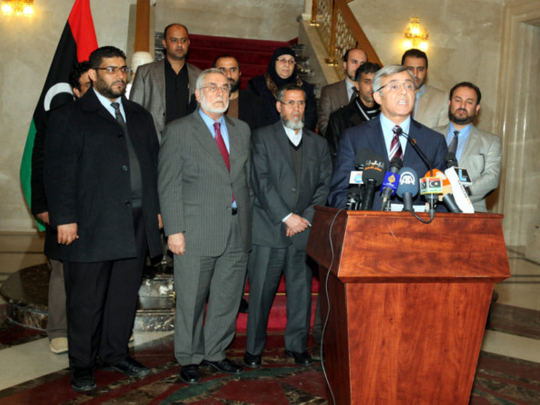
Tripoli: Libya’s ousted prime minister Ali Zeidan fled to Europe after parliament voted him out, leaving behind a country that risks being torn apart as the fault line between its eastern and western regions broke open on Wednesday to a degree unseen since the 2011 civil war that ousted longtime strongman Muammar Gaddafi.
A western-based militia fighting in the name of parliament has launched an offensive against an autonomy-minded militia in the east that has for months occupied most of Libya’s crucial oil facilities — seizing virtual control of the country’s most vital resource and almost sole source of cash. This past week, it succeeded in exporting a tanker of oil from a port it holds in defiance of the central government.
In response to the offensive other militias in the east are rallying to fight back. Eastern leaders have warned that unless Tripoli backs down they will seek outright independence for their region rather than greater autonomy.
Since Gaddafi’s fall, Libya has been torn among multiple, rival, heavily armed militias affiliated to regions, cities and tribes, while the central government has been weak, unable to bring its authority over the country, inheriting Gaddafi-era military and police forces in disarray. Furthermore, militias have lined up on rival sides of a political struggle between Islamist politicians and their opponents.
Now the success by the Islamist-leaning parliament in voting out secular figure Ali Zeidan as prime minister on Tuesday has sparked fears among their opponents of a power grab by the Islamists — tensions that also could translate into militia clashes. After the vote, militias demanded rival militias leave the capital, Tripoli. Instead, some anti-Islamist militias beefed up their positions in the city with armoured vehicles mounted with heavy machine guns and anti-aircraft guns.
The Islamist parliament chief, Nouri Abu Sahmein, who had mandated the powerful militia from the western city of Misrata to launch its offensive to win back control of the oil facilities, appeared on Wednesday to be trying to pull back from an outright conflict with the east. In a statement, he said parliament had agreed to give the eastern militia, known as the Cyrenaica Defence Force, two weeks to end its occupation of the oil facilities.
Still, the Cyrenaica Defence Force has already repeatedly refused to withdraw from the ports, and there are concerns the tensions are moving out of control.
“We fear falling into a sea of darkness,” former Interior Minister Ashour Shway told The Associated Press, denouncing the decision to launch the offensive against the eastern militia.
Shway warned that the armed build-up on both sides could lead inexorably to conflict. “The drums of war are now banging,” he said, speaking from Benghazi, the country’s second largest city and the heart of the eastern region. “We need sane people to take the lead and stop this from happening.”
The eastern half of Libya — where most of its oil resources are located — has long complained of discrimination by Tripoli, saying Gaddafi’s government starved it of resources during his 42-year rule.
In 2012, a group of politicians, activists and some powerful tribes backed by militias declared autonomy for the region, which is historically called Cyrenaica or, in Arabic, Barqa. Last year, they set up an administration and demand the country set up a federal system that would enshrine considerable self-rule powers for the regions and ensure a fairer sharing of resources.
The Cyrenaica Defence Forces militia, led by a commander named Ebrahim Jedran, seized the eastern oil facilities last year, virtually shutting down exports. That has made him a hero for some in the autonomy movement, though some in the east rejected his use of force in the move.
The crisis escalated over the past week, when Jedran’s fighters loaded a North Korean-flagged tanker with oil at one of the Mediterranean ports they control, Al Sidra to export. Forces from the rival Misrata militia vowed to stop the tanker, and at one point, Tripoli authorities claimed to have recaptured the vessel.
But on Wednesday, Culture Minister Al Habib Al Ameen admitted at a press conference that the tanker had managed to escape Libyan waters. It is not known who the militia is selling to oil to.
Throughout the days-long standoff over the tanker, prime minister Zeidan had appeared helpless, acknowledging to reporters that the military was not obeying his orders and complaining that “everyone is working against the government.” Zeidan was the country’s first democratically chosen prime minister since Gaddafi’s fall and had been backed by the United States and other Western powers.
After his removal in parliament’s no-confidence vote, Zeidan left the country, despite a travel ban announced by the general prosecutor, who said he could face an investigation into corruption allegations. The allegations stem from an alleged attempt to bribe Jedran’s militia to surrender the ports.
His defence minister, Abdullah Al Thinni, was named interim prime minister, though he is seen by many Libyans as part of the failure to resolve the oil ports crisis. Some of Zeidan’s backers in parliament walked out during the no-confidence vote and have disputed its legitimacy.
Zeidan made a brief stopover in the Mediterranean island of Malta before travelling on, Maltese Prime Minister Joseph Muscat told state-owned television. He did say where Zeidan was headed.
As parliament voted out Zeidan, the Misrata militia stormed the coastal city of Sirte on Tuesday, driving out fighters from Jedran’s militia, as a prelude to an assault on Al Sidra, the oil port further east along the coast.
In response, eastern militias were mobilising fighters in the Red Valley, a desert valley between Sirte and Al Sidra, to block their advance, said Essam Al Jehani, a leader of the Cyrenaica autonomy movement.
He accused Islamists of launching the assault on the east after “they carried a coup in Tripoli and ousted Zeidan.”
“They will force us to separate,” he added, echoing a sentiment voiced by a day earlier by a group of eastern tribal elders, who said in a joint statement that if the assault continued they would change their demands from federalism to independence.
At the same time, the pro-Islamist militias were vowing to wrest back the oil facilities — though Abu Sahmein’s announcement of a two-week ultimatum could give some breathing room, at least putting off a confrontation.
The Misrata militia leading them is one of the most powerful in the country. One Misrata-based politician, Mohammad Al Fetori, vowed that when its forces assault the facilities, “Jedran will run away.” He denounced Jedran’s eastern militia as “remnants” of Gaddafi’s regime that must be gotten rid of.
“The military solution appears to be the only one left now after months of failed peaceful ones,” said Adel Al Tarhouni, spokesman of another pro-Islamist collection of militias known as the Libya Revolution Operation Room, which was fighting alongside the Misrata forces.


